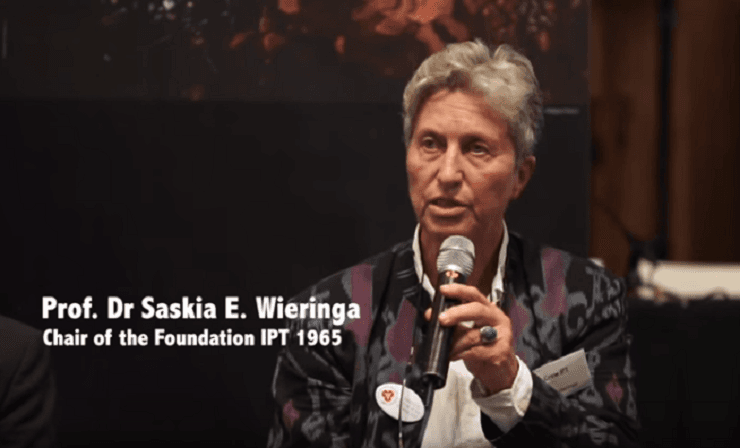ASIACALLING
US, UK and Australia complicit in Indonesia’s 1965 genocide
"The Indonesian government is deflecting calls that it apologize for the murder and torture of at least half a million people in 1965, after the International People's Tribunal called it genocide."
Nicole Curby

The truth about the mass killings of at least half a million suspected communists in Indonesia in the 1960s is one that has long been obscured and denied.
But this week a ruling by the International People’s Tribunal at the Hague, in the Netherlands, has bought new facts to light – of how the Indonesian government was responsible for the genocide, and how foreign governments were complicit in the atrocity.
From Jakarta, Nicole Curby spoke with a coordinator of the tribunal to find out more.
This week the Indonesian government was deflecting calls that it apologize for the murder and torture of at least half a million people.
The International People’s Tribunal has found that through a direct chain of command, the Indonesian government ordered the extermination of suspected communists and their sympathizers.
“Indeed in Indonesia some very serious crimes against humanity were committed. Mass killings, exterminations, slavery, illegal imprisonment, forced disappearances, sexual violence. Torture of course,” reported research coordinator of the International People’s Tribunal, Saskia Wieringa.
After hearing evidence from survivors and experts, the panel of seven internationally recognized judges concluded the events of 1965-66 warrant the definition of genocide.
A serious condemnation, explains Professor Wieringa.
“You can compare this genocide to the Armenian Genocide, but also to the genocide of the Jews in Nazi Germany, to the purifications of Stalin and Mao, in Russia and China. So this is really a very serious condition. We are now of course taking it forward to the United Nations to see if we can get a resolution.”
The burden of responsibility falls heavy upon the shoulders of the Indonesian government, but other nation states – the governments of America, Britain and Australia – were complicit too.
According to Wieringa, complicity has a number of aspects.
“First of all, did the governments know about the mass killings, the exterminations that were taking place. The full answer is yes. There is an abundance of evidence both from foreign journalists reporting, and also from their own diplomatic mail. We have researched Great Britain, the US and Australia, the three major countries. They knew. They were fully aware,” says Wieringa.
At the height of the Cold War, and intense fears around the global spread of communism, a failed coup and the murder of six generals in 1965 was blamed on the Indonesian communist party, or the PKI.
At the time the PKI was the third-largest communist party in the world after China and Russia.
Some foreign powers turned a blind eye to the slaughter that ensued.
“No government did anything to prevent it, and they supported the Suharto regime. They supported the Suharto regime with money, with small weapons, particularly the Americans, and communications apparatus, and they provided names. And the names were people who were leaders, local leaders of the communist party and their affiliate organizations. And I think all the people on those lists were murdered.”
While Great Britain was engaged in a confrontation with Indonesia at the Malaysian border, they eased pressure on the military, freeing up troops to participate in the mass killings.
“It is very clear that the British government at the time said, ‘Please go ahead with your murders in Java and in Bali, take your troops away, we won’t attack you. This confrontasi we will freeze it for some time.’ There is strong indication that they provided help to transport troops back to Java so they could be assisting in killing,” explains Wieringa.
And finally, the governments of all three foreign powers deliberately spread anti-communist propaganda via their news services.
“The British Government had an expert in psychological warfare stationed in Singapore and he helped spread slander. The propaganda effectively dehumanized – and that’s one precondition for genocide - it dehumanized supporters of Sukarno or leftist, progressive people, and therefore paved the way for killing them.”
Although long suppressed, the truth of 1965 is slowing coming to light.
In April this year the government supported a symposium on the events of 1965– a huge step for the country in addressing its dark past.
Even still, the government has drawn a line at offering an official apology. And those close to the president have rejected the findings of the tribunal this week, pointing out the ruling is non-binding and lacking any power of enforcement.
Coordinating Minister for Political, Legal and Security Affairs, Luhut Panjaitan declared,
“Why do we let others to tell us what to do? We have to be proud as Indonesians. There is no genocide. How many people died? None!”
But Wieringa says the state, and president Joko Widodo, known here as Jokowi, has to take responsibility.
“People say that our president Jokowi has done nothing wrong, why should he apologize, Suharto has to apologize. But this is of course mistaking the concept of state responsibility. We are aiming at state responsibility, and Jokowi being the representative of state at this moment, Jokowi has to take on responsibility for the crimes committed by the state of Indonesia in 1965.”
The tribunal is now setting out to lobby global actors, the Human Rights Council and the United Nations, to pressure foreign governments to acknowledge their role in Indonesia’s genocide.
- Nicole Curby
- Indonesia 1965
- International People's Tribunal 1965
- Dr Saskia Wieringa
Komentar
KBR percaya pembaca situs ini adalah orang-orang yang cerdas dan terpelajar. Karena itu mari kita gunakan kata-kata yang santun di dalam kolom komentar ini. Kalimat yang sopan, menjauhi prasangka SARA (suku, agama, ras dan antargolongan), pasti akan lebih didengar. Yuk, kita praktikkan!